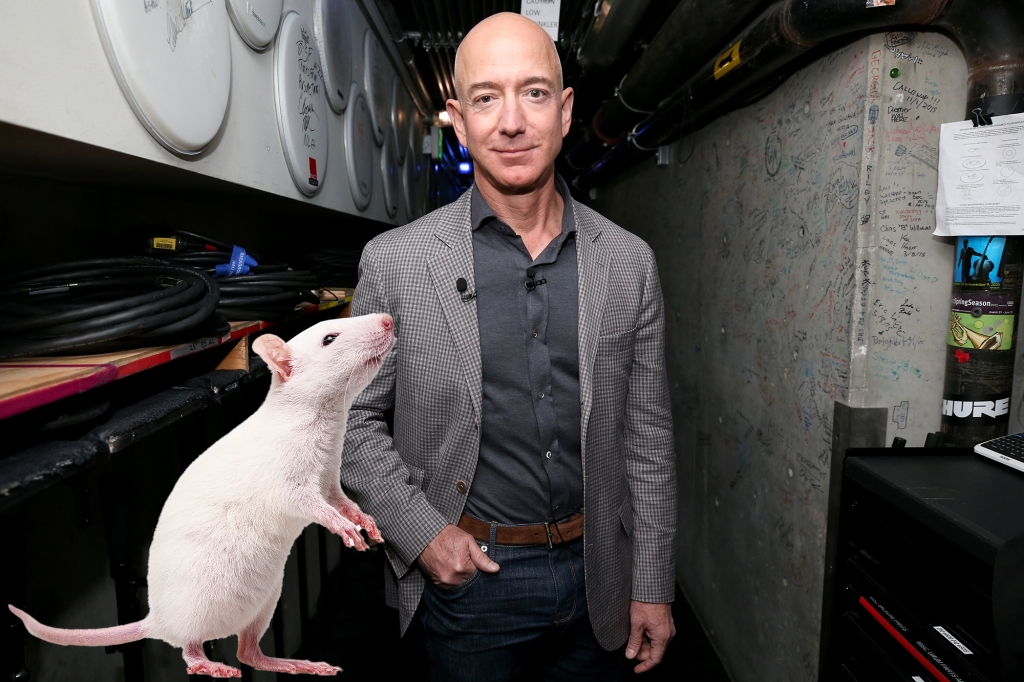5 new technologies could turn our world into scary, real-life ‘Peripheral’

Hit Amazon Prime TV series “The Peripheral,” based on William Gibson’s novel of the same name, depicts a grim planet Earth in the year 2099, when a much-reduced human population relies on artificially intelligent robot servants and virtual-reality headsets allow people to travel back in time. (There are also invisible cars).
Some of the technologies the series depicts exist in embryonic form today — such as Amazon’s AI bot Alexa or Meta’s Virtual Reality headsets. But, if you think the show’s Armageddon prophecy is just science fiction, think again.
There are many real-life advancements currently in development that could upend our world as we know it. Here are five big ones . . .

QUANTUM COMPUTING
Experts warn that a new kind of computer could literally “break the Internet” — leaving everything from state secrets to bank accounts at the mercy of criminals.
Quantum computers, currently under development at Google, IBM and other institutions around the world, could become the most powerful computers on the planet, speeding up processes such as drug discovery and even possibly preventing some cancers.
Rather than using “bits” of ones and zeroes to compute, quantum computers have “qubits” where the numbers can be one, zero or both at the same time — unlocking unheard-of processing power.
But this power comes with its dangers, warns David Mahdi, CSO and CISO advisor at cybersecurity company Sectigo.
Quantum computers, Mahdi said, “have so much processing power they will make the encryption we have today unfit for purpose in an instant. This means that all the world’s data will no longer be secure — think of everything from bank account details to medical records to state secrets.”
All encryption systems rely on what’s known as Public Key Infrastructure (PKI). Normal computers need about 300 trillion years to break PKI — but a quantum computer would be able to do it in a week, Mahdi says. This would mean every piece of data on Earth is vulnerable, potentially triggering a “Quantum Apocalypse” or Q-Day where encryption on the internet suddenly becomes vulnerable to anyone with a quantum computer. Today’s quantum computers are still at an early stage, with the most powerful in the world, IBM’s Osprey, having just 400 qubits. (Millions or even billions of qubits are needed to break bank encryption.)
Mahdi says organizations can protect themselves by transitioning to new “quantum-safe” encryption, but companies need to start planning this now, or be caught in the Q-Day meltdown. Sectigo has said that “Q-Day” could come within 10 or 15 years.

KILLER DRONES
Normally, drones are “driven” remotely by pilots, and the decision to attack or kill is always made by a human being. But the expense of highly trained combat pilots could tempt military leaders to switch to cheaper autonomous weapons.
In fact, it’s already happening.
In 2020, the interim Libyan government launched an autonomous Turkish Kargu-2 drone that attacked retreating rebel soldiers in the African country, according to a UN report.
The lethal autonomous system was programmed to act of its own accord “without requiring data connectivity between the operator and the munition: in effect, a true ‘fire, forget and find’ capability,” the report said.
“From a warfare perspective, autonomous drones provide an attractive proposition,” said robotics expert, UK professor Kevin Warwick. “Low intelligence, low tech, low cost but high payload autonomous drones are perhaps the most popular at the moment.”
In 2017, technology leaders including Elon Musk wrote to the UN calling for autonomous weapons to be banned in the same way chemical weapons are today. Musk dubbed them a “Pandora’s box,” marking a “third revolution” in warfare after gunpowder and nuclear weapons.
“Once developed, lethal autonomous weapons will permit armed conflict to be fought at a scale greater than ever, and at timescales faster than humans can comprehend,” Musk and his fellow authors warned.
But international agreements to limit their use will be difficult to enforce, Warwick said.
“We could possibly be looking at a network of AI drones with very different tasks,” he said. “Each individual drone might be relatively simple/stupid, but when networked together the overall system is an extremely powerful military machine.”

one physicist fears.
NANOTECHNOLOGY
Nanotechnology, which manipulates atoms and molecules to achieve tiny miracles, could one day lead to little machines that revolutionize the way we live.
Hospitals already use magnetic nanoparticles to deliver drugs within the human body and silver nanoparticles to help fight infection.
But, as the technology evolves, some believe it could be used to create devastating weapons. A 2008 University of Oxford study ranked nanoweapons as having a one in 20 chance of exterminating humanity by the end of the 21st century.
As depicted in the novel “Prey” by prolific science-fiction author Michael Crichton, these weapons could take on the form of artificially intelligent “swarms” of tiny robots that devour people like a swarm of locusts.
In his book “Nanoweapons: A Growing Threat to Humanity,” physicist Louis Del Monte describes the threat of artificially intelligent nanobots that can self-replicate by seeking out the right atoms and assemble new clones of themselves, capable of surveillance and assassination.
“Once released, their mission would be twofold,” he writes, “Kill humans and replicate . . . 90% of the human race could fall victim to their attacks in a matter of weeks.”

SOLAR GEOENGINEERING
In the battle against climate change, ideas don’t come much bigger than “solar geoengineering” or solar radiation management (SRM), where particles are sprayed into the atmosphere to mimic the world-chilling effects of huge volcanic eruptions.
The idea is backed by tech billionaire Bill Gates, who financed a large Harvard study into the feasibility of flying jets more than 10 miles up to release carbonate dust, which cools the planet.
But scientists warn that solar geoengineering could spark “termination shock” where temperatures rebound rapidly, causing uncontrolled climate change and unpredictable extreme weather effects.
Earlier this year, 60 scientists signed an open letter published in the journal WIREs Climate Change calling for an international agreement to avoid solar geoengineering technology.
“Governments and the United Nations need to take effective political control and restrict the development of solar geoengineering technologies before it is too late,” it stated.

LIFE EXTENSION
For years, wealthy investors — from PayPal’s Peter Thiel to Google’s Sergei Brin — have poured money into technology to extend human life, leading to some exciting recent breakthroughs.
Bodies of mice have been successfully “rejuvenated,” reversing the signs of aging in their tissues, and allowing them to live 30% longer.
Earlier this year, life extension company Altos Labs celebrated the biggest biotechnology launch in history, backed by a $3 billion investment that reportedly included money from Jeff Bezos. Altos is said to be poaching scientists from around the world and paying them $1 million a year.
Juan Carlos Izpisúa Belmonte of Altos labs has said he believes human lifespans could be extended by up to 50 years, either by using genetic therapies or chemical drugs.
Anti-aging medicine will be a discovery on a par with that of antibiotics, says Dr Andrew Steele, author of “Ageless: The New Science of Getting Older Without Getting Old.”
“Aging is responsible for more disease and death than anything else on the planet, two thirds of deaths globally. If we could develop medicines that could slow down and perhaps even partially reverse the aging process, people will not just be living longer, they’ll be healthier and happier,” Steele said.
But experts also warn the technology could lead to overpopulation that damages world economies.
By 2030, one in six people in the world will be 60 or over, according to the World Health Organization, leading countries to struggle with the cost of looking after its elderly population.
Already in Japan, there is a dearth of younger people to care for its elderly citizens, so the country has developed “care robots” to look after its aging populace.
An older population also means we must fundamentally rethink how retirement and pensions work, experts said.
“These are actually problems that we desperately need to address anyway, like pension ages have to rise because we’re already seeing an unsustainable burden of older people in lots of countries around the world,” Steele said.
The technology could also fuel social division. With much of the research funded by Silicon Valley billionaires, experts are warning against a world where the rich survive and the poor are doomed to die.
This year Elon Musk also said he disapproved of the technology, stating, “It would cause asphyxiation of society, because the truth is, most people don’t change their mind. They just die. So if they don’t die, we will be stuck with old ideas and society wouldn’t advance.”



